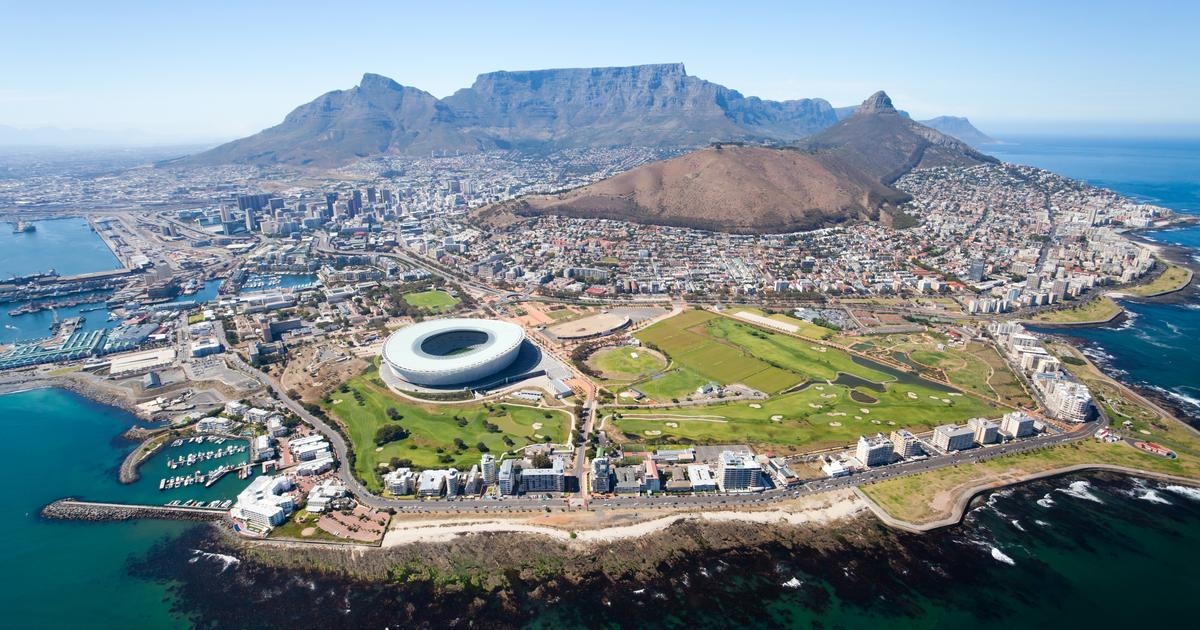South Africa, located at the southern tip of the African continent, is a country renowned for its breathtaking landscapes, diverse cultures, and rich history. From the iconic Table Mountain in Cape Town to the wildlife-rich Kruger National Park, South Africa offers a unique blend of natural beauty and cultural experiences, making it a premier destination for travelers from around the globe.
Table of Contents
Geography
South Africa covers an area of approximately 1,221,037 square kilometers, making it the 25th largest country in the world. Bordered by Namibia, Botswana, and Zimbabwe to the north, Mozambique to the northeast, and the Indian and Atlantic Oceans to the south and west, South Africa boasts a varied landscape that includes mountains, plateaus, deserts, and coastlines.
The country is divided into nine provinces, each with its own unique geography and attractions. The Western Cape is famous for its vineyards and stunning coastal scenery, while KwaZulu-Natal is known for its rich cultural heritage and beautiful beaches. The highveld, with its rolling grasslands, is home to major cities like Johannesburg and Pretoria, while the arid regions of the Karoo and Kalahari Desert showcase South Africa’s diverse ecosystems.
In addition to its diverse geography, South Africa is also home to numerous national parks and reserves, including the renowned Kruger National Park, which is one of the largest game reserves in Africa. These protected areas are vital for wildlife conservation and offer visitors the opportunity to experience the country’s rich biodiversity up close.
States of South Africa
South Africa is divided into 9 provinces. Here’s a table of South Africa’s 9 provinces along with their capitals:
| No. | Province | Capital |
|---|---|---|
| 1 | Eastern Cape | Bhisho |
| 2 | Free State | Bloemfontein |
| 3 | Gauteng | Johannesburg |
| 4 | KwaZulu-Natal | Pietermaritzburg |
| 5 | Limpopo | Polokwane |
| 6 | Mpumalanga | Mbombela |
| 7 | Northern Cape | Kimberley |
| 8 | North West | Mahikeng |
| 9 | Western Cape | Cape Town |
History
South Africa has a complex and multifaceted history that has shaped its society and culture. The region was inhabited by indigenous groups, including the San and Khoikhoi peoples, for thousands of years before the arrival of European explorers. In the late 15th century, Portuguese sailors were among the first Europeans to reach the southern coast of Africa.
In the 17th century, the Dutch established a refreshment station at Cape of Good Hope, leading to the establishment of a colony. Over the following centuries, British and Dutch settlers arrived, resulting in conflicts with indigenous populations and the eventual establishment of apartheid, a system of institutionalized racial segregation that lasted from 1948 to the early 1990s.
The struggle against apartheid was marked by significant resistance from various groups, including the African National Congress (ANC), led by figures such as Nelson Mandela. After years of activism and international pressure, apartheid officially ended in 1994, leading to the first democratic elections and the election of Nelson Mandela as the country’s first black president.
Today, South Africa is a constitutional democracy with a diverse population representing various ethnicities and cultures. The legacy of apartheid continues to influence the country’s social and economic landscape, but ongoing efforts toward reconciliation and nation-building are paving the way for a brighter future.
Top Ten Must-Visit Destinations
1. Cape Town
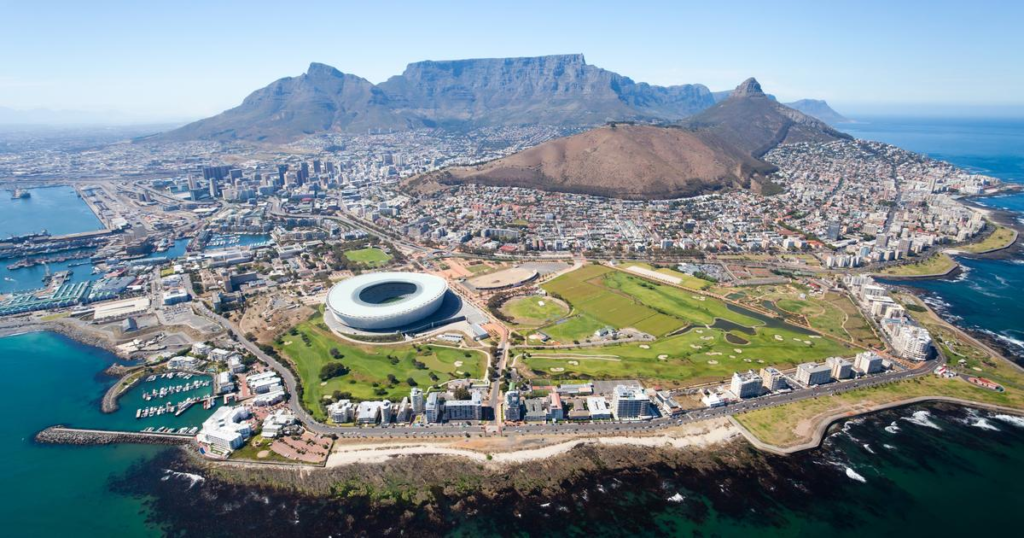
Cape Town, known for its stunning natural beauty and vibrant culture, is often regarded as one of the most picturesque cities in the world. Visitors can explore iconic landmarks such as Table Mountain, the V&A Waterfront, and Robben Island, where Nelson Mandela was imprisoned. The city’s diverse neighborhoods, such as Bo-Kaap and Camps Bay, offer a mix of culinary delights and cultural experiences.
2. Kruger National Park

Kruger National Park is one of Africa’s largest game reserves, spanning nearly 2 million hectares. Home to the Big Five (lion, elephant, buffalo, leopard, and rhinoceros), the park offers a variety of wildlife viewing opportunities, including guided safaris and self-drive tours. Visitors can also enjoy eco-tourism activities, such as birdwatching and bushwalking.
3. Johannesburg

Johannesburg, the largest city in South Africa, is a vibrant hub of culture and history. The Apartheid Museum provides insight into the country’s tumultuous past, while the Maboneng Precinct is known for its trendy restaurants, art galleries, and street markets. The nearby Soweto township offers a glimpse into South Africa’s cultural diversity and rich history.
4. Durban
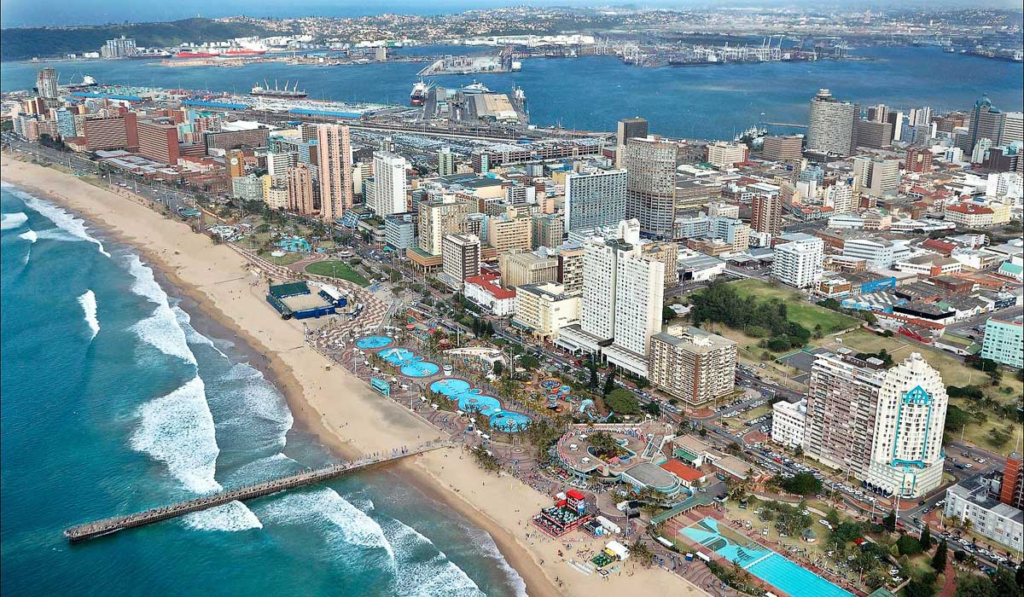
Durban, located along the eastern coast, is famous for its beautiful beaches and warm climate. The city’s Golden Mile features a stretch of sandy beaches ideal for sunbathing and water sports. Visitors can explore the uShaka Marine World, a marine theme park, and enjoy traditional Indian cuisine in the bustling neighborhoods.
5. Garden Route
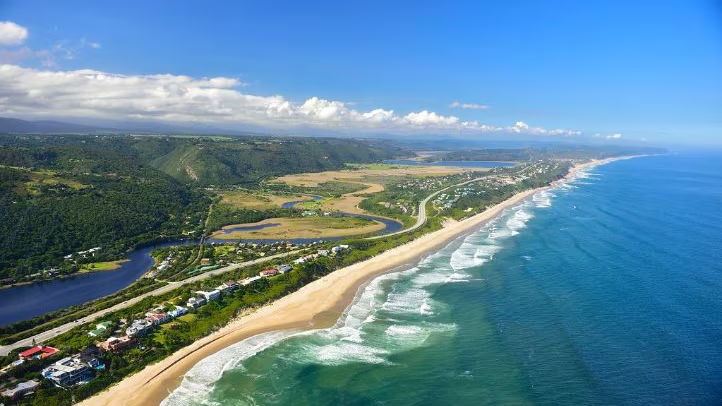
The Garden Route is a scenic stretch along the southern coast, known for its breathtaking landscapes, lush forests, and charming towns. Popular stops along the route include Knysna, famous for its oysters, and Plettenberg Bay, known for its pristine beaches. Outdoor enthusiasts can enjoy hiking, cycling, and whale watching in this picturesque region.
6. Stellenbosch

Stellenbosch is a charming town in the Western Cape, renowned for its world-class wineries and beautiful vineyards. Visitors can take wine tours, indulge in wine tastings, and enjoy gourmet dining experiences amidst stunning landscapes. The town’s rich history is reflected in its well-preserved Cape Dutch architecture.
7. Pretoria
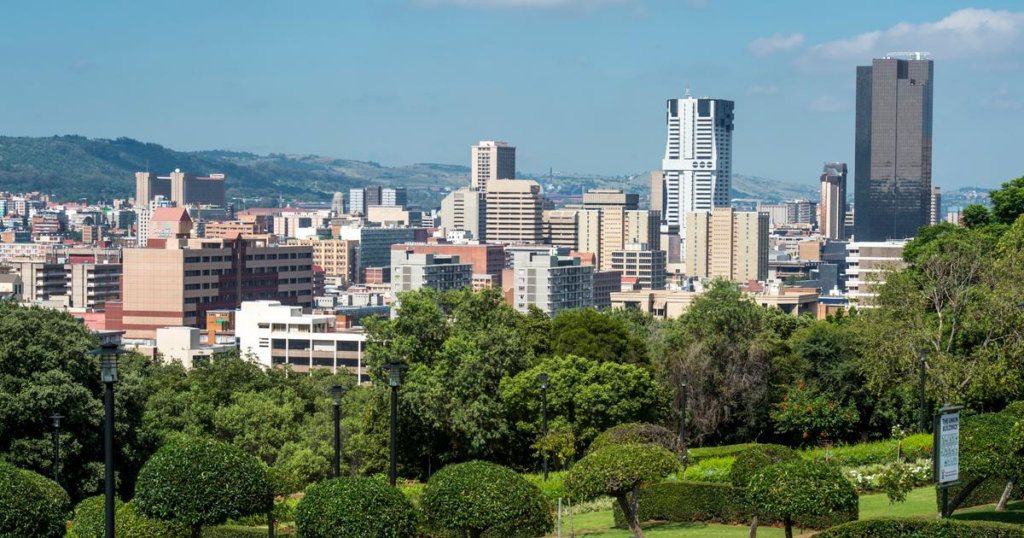
Pretoria, the administrative capital of South Africa, is known for its beautiful parks and historical landmarks. The Union Buildings, the official seat of the government, offer stunning views of the city. Visitors can also explore the Pretoria Botanical Gardens and the Voortrekker Monument, which commemorates the Boer pioneers.
8. Blyde River Canyon
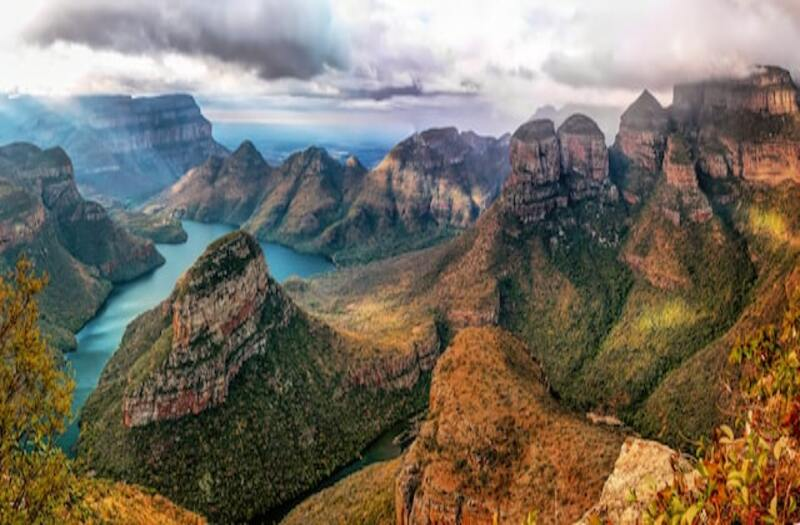
The Blyde River Canyon is one of the largest canyons in the world, offering breathtaking views and outdoor adventure opportunities. Visitors can hike along scenic trails, take boat trips on the river, and enjoy panoramic vistas from viewpoints such as God’s Window and Bourke’s Luck Potholes.
9. Robben Island
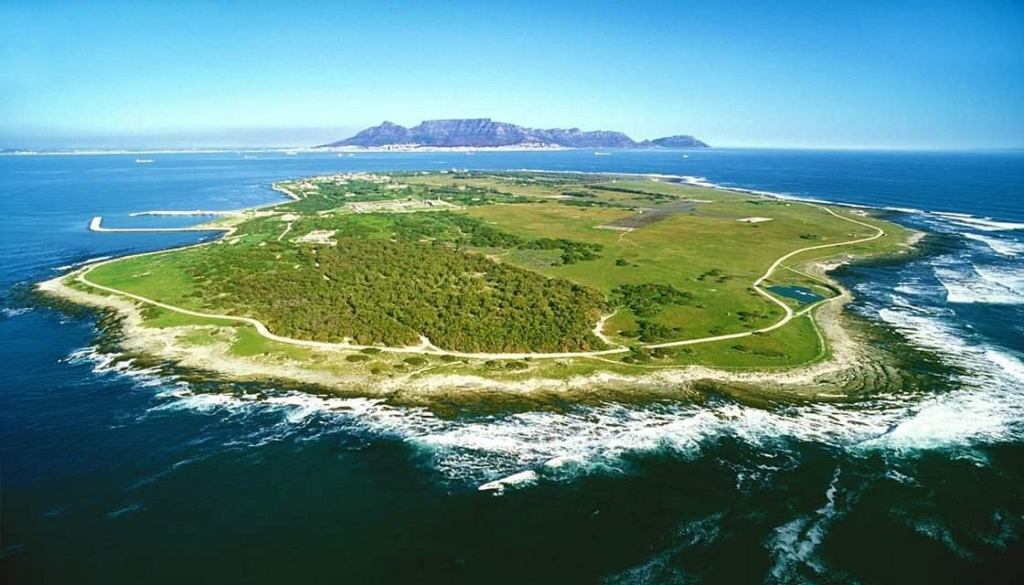
Robben Island, a UNESCO World Heritage Site, is a must-visit for those interested in South Africa’s history. The island served as a prison for political prisoners, including Nelson Mandela. Guided tours provide insight into the island’s history and the struggle against apartheid.
10. Drakensberg Mountains
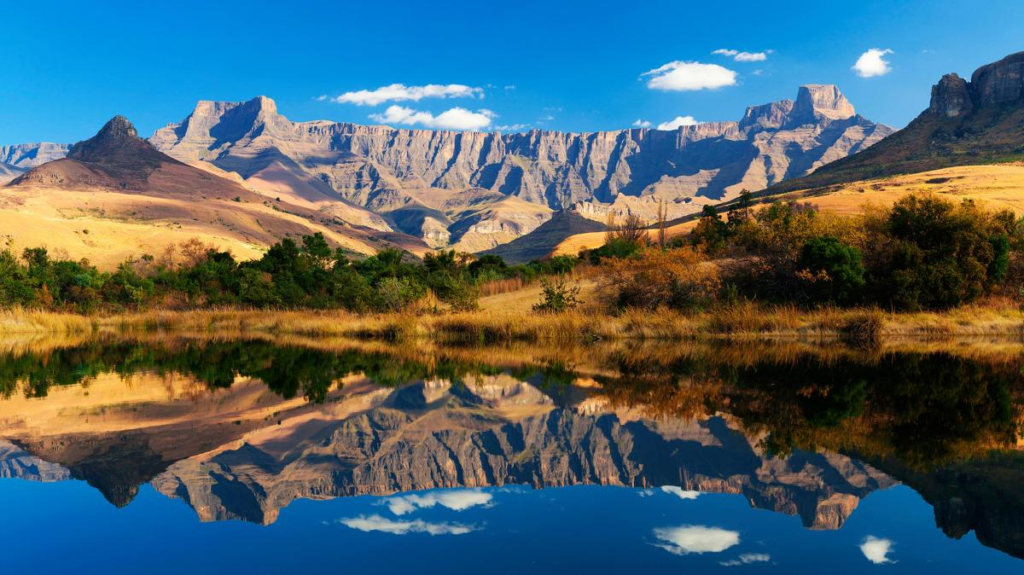
The Drakensberg Mountains, a UNESCO World Heritage Site, offer stunning scenery and outdoor activities. The area is known for its hiking trails, including the famous Amphitheatre route, which features dramatic cliffs and waterfalls. The mountains are also home to ancient San rock art and diverse wildlife.
Culture
South Africa’s culture is a vibrant tapestry of traditions, languages, and customs, shaped by its diverse population. The country recognizes 11 official languages, including Zulu, Xhosa, Afrikaans, and English, reflecting its rich linguistic heritage. Each ethnic group contributes to the cultural mosaic, celebrating their unique traditions through music, dance, and art.
Traditional music plays a vital role in South African culture, with genres such as mbaqanga, kwaito, and isiZulu music being popular among the locals. The annual National Arts Festival in Grahamstown showcases the country’s artistic talent, featuring performances, exhibitions, and workshops.
Cuisine in South Africa is equally diverse, influenced by various cultural traditions. Traditional dishes include braai (barbecue), bobotie (a spiced meat dish), and biltong (dried cured meat). The country’s wine industry is world-renowned, with the Cape Winelands producing some of the finest wines globally.
Festivals
South Africa is home to numerous festivals that celebrate its diverse cultures and traditions. One of the most significant events is the Cape Town International Jazz Festival, attracting music lovers from around the world. The festival features local and international artists, showcasing the vibrant jazz scene in South Africa.
Another prominent festival is the National Arts Festival, held annually in Grahamstown. This event showcases a wide range of artistic performances, including theater, dance, music, and visual arts, providing a platform for both established and emerging artists.
The Durban International Film Festival is also noteworthy, highlighting local and international films while promoting South African cinema. The festival features screenings, workshops, and discussions, celebrating the art of filmmaking.
Economy
South Africa has one of the most developed economies in Africa, driven by diverse sectors, including mining, agriculture, manufacturing, and services. The country is rich in natural resources, particularly minerals such as gold, platinum, and diamonds, which play a crucial role in its economy.
Agriculture is another vital sector, with South Africa being a significant exporter of agricultural products, including citrus fruits, wine, and maize. The country’s diverse climate and fertile soil support various farming activities, contributing to food security and economic growth.
The tourism industry is also a key driver of the economy, attracting millions of visitors each year who seek to experience the country’s natural beauty and cultural richness. Efforts to promote sustainable tourism and conservation are essential for preserving South Africa’s unique landscapes and wildlife.
Despite its economic strengths, South Africa faces challenges, including high unemployment rates, income inequality, and social unrest. Ongoing efforts to address these issues and promote inclusive growth are crucial for the country’s future prosperity.
Cuisine
South African cuisine is a delightful fusion of flavors and influences from various cultures. Traditional dishes often feature meat, vegetables, and spices, reflecting the country’s diverse culinary heritage. One of the most popular dishes is “braai,” a social barbecue gathering where meats are grilled over an open flame, often accompanied by side dishes like potato salad and pap (a maize porridge).
Other traditional favorites include “bobotie,” a spiced minced meat dish topped with egg custard, and “biltong,” a popular snack made from dried and cured meat. South African curries, influenced by Indian cuisine, are also widely enjoyed, showcasing a blend of aromatic spices and flavors.
The country is famous for its wine production, particularly in the Cape Winelands region. South African wines, including Chenin Blanc and Pinotage, are highly regarded and often paired with traditional dishes during meals.
Top Eight Most Famous Food of South Africa
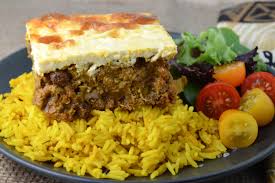
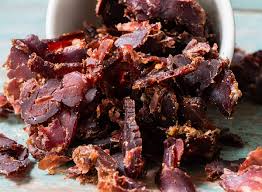

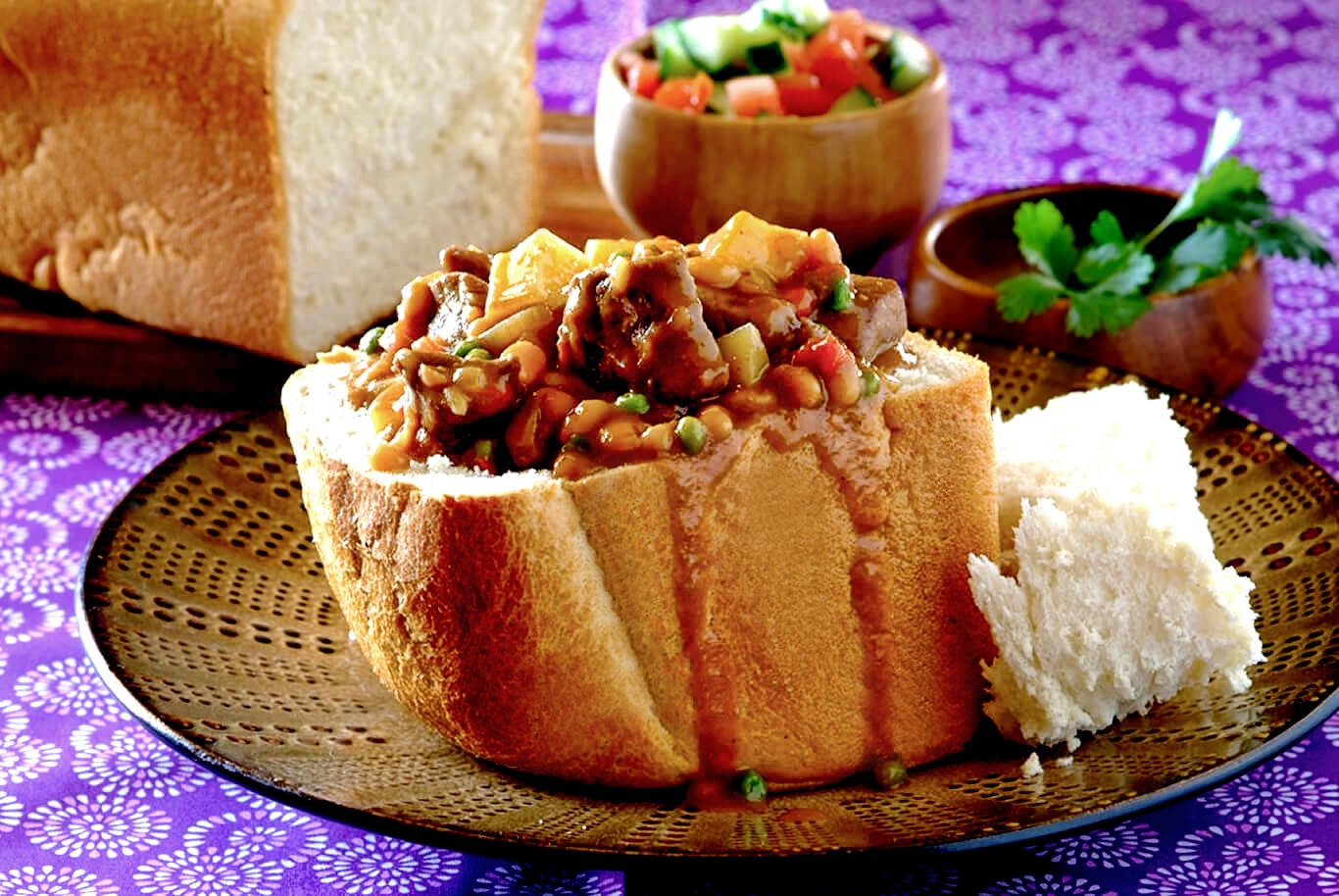
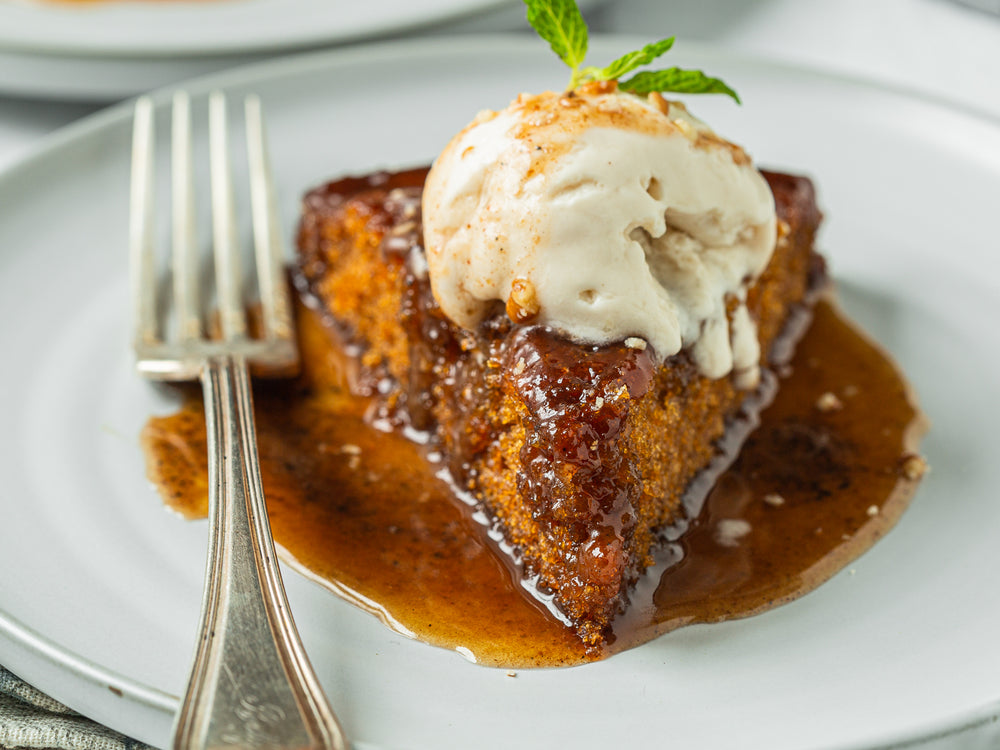

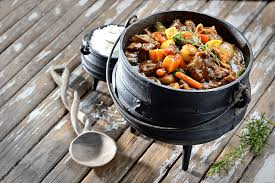
Interesting Facts
- South Africa is known as the “Rainbow Nation” due to its diverse cultures and ethnic groups.
- The country is home to the world’s largest individually timed cycle race, the Cape Town Cycle Tour.
- South Africa has three capital cities: Pretoria (administrative), Cape Town (legislative), and Bloemfontein (judicial).
- The Cradle of Humankind, a UNESCO World Heritage Site, is located near Johannesburg and contains some of the world’s oldest hominid fossils.
- South Africa has a unique flower called the King Protea, which is also the national flower.
- The country boasts the world’s highest commercial bungee jump from the Bloukrans Bridge.
- South Africa is home to the Great Karoo, a semi-desert region that is one of the largest in the world.
- The national animal of South Africa is the springbok, which is also a symbol of the national rugby team.
- The country produces approximately 60% of the world’s platinum supply.
- South Africa is known for its rich wildlife, with over 300 species of mammals, including the Big Five.
Conclusion
South Africa is a land of stunning contrasts, where natural beauty meets a rich tapestry of cultures. Its history of resilience and transformation is reflected in the vibrant communities and diverse landscapes that make the country a unique destination for travelers. From the breathtaking coastlines to the majestic mountains, South Africa invites visitors to explore its wonders, indulge in its culinary delights, and immerse themselves in its rich heritage. As the nation continues to grow and evolve, it remains a beacon of hope and possibility on the African continent.

